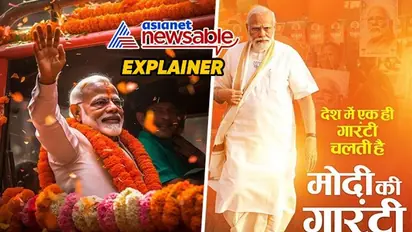Gearing up for hat-trick in 2024: How state polls results show 'Modi magic' remains strong in Hindi heartland

Synopsis
An analysis of the recent assembly polls in India reveals the BJP's successful strategy centered on Narendra Modi's appeal, welfare policies, and organizational prowess, consolidating its dominance in the Hindi heartland while facing challenges in the southern states.
The results of the assembly polls on Sunday have strongly validated the BJP's approach, which revolves around the appeal of Prime Minister Narendra Modi and the governance agenda. This has effectively dashed the Congress' aspirations for a resurgence in the Hindi heartland and reinforced the perception that the ruling party is positioned as the front-runner to secure power for a third consecutive term in the upcoming 2024 elections.
In a strategic move, the BJP opted not to project any chief ministerial candidate, instead basing its campaign on broader narratives that highlight the achievements of the Modi government. Despite some skepticism in certain quarters, especially considering the Karnataka elections where a similar strategy faced challenges, the BJP's approach seems to have resonated effectively in the five-state polls.
Despite a significant victory in Karnataka that bolstered the Congress' confidence, suggesting a potential counter-punch backed by local leadership and welfare assurances against the BJP, Sunday's verdict indicates the enduring strength of the 'Modi magic.' It is evident that the charismatic appeal of Prime Minister Modi continues to wield significant influence, particularly in states where the BJP has a robust organizational presence.
If anything, the BJP heightened its focus on the prime minister during these elections, prominently featuring his assurances in their manifestoes. Modi actively campaigned across the poll-bound states, excluding Mizoram, seeking widespread support to fulfill his commitments to welfare and development. This strategy reinforces the enduring impact of the 'Modi magic' in shaping electoral outcomes.
Following the announcement of polls, Prime Minister Modi actively engaged in the election campaigns, delivering 14 rallies in both Rajasthan and Madhya Pradesh, along with five in Chhattisgarh. His presence was notable with two large-scale roadshows in Rajasthan and one in Madhya Pradesh, where his arrivals at rally venues were characterized by triumphant drives through enthusiastic supporters.
The BJP's significant victory in Chhattisgarh and Madhya Pradesh has surpassed the expectations of even some party leaders. Most exit polls had indicated a potential edge for the Congress in Chhattisgarh and offered mixed forecasts for Madhya Pradesh, making the scale of the BJP's triumph a noteworthy outcome.
A well-orchestrated campaign led by the central leadership, with a particular focus from Home Minister Amit Shah on Madhya Pradesh and Chhattisgarh, proved highly effective, according to party leaders.
The campaign strategically tapped into the prevailing anti-incumbency sentiments against the Bhupesh Baghel-led government, countering any perceived indifference towards the Shivraj Singh Chouhan-led dispensation. This success was achieved through meticulous groundwork, involving various regional leaders, MPs, and Union ministers who actively contested the elections.
Despite facing challenges, Chief Minister Shivraj Singh Chouhan managed to make a compelling case for his government by emphasizing its schemes, notably the 'ladli bahna' scheme. He also established an emotional connection with voters, successfully countering detractors and contributing to the campaign's overall success.
He strategically molded his image as the amiable 'mama' (maternal uncle) of the people, and by all indications, this approach proved highly effective. His persona as a genial and relatable figure stood in stark contrast to the perceived arrogance and lack of teamwork associated with Congress' chief ministerial face Kamal Nath, winning him considerable favor.
The BJP, under his leadership, can take pride in the Congress' significant setback in the three Hindi-speaking states. This victory is particularly satisfying as the opposition, led by Rahul Gandhi, had placed considerable emphasis on the demand for a caste census to connect with voters from the Other Backward Classes.
Also read: 'North-South Divide' jibe: Congress just shot itself in the foot again
The BJP, following the lead of the Congress, significantly emphasized welfare policies, marking a potential shift in its strategy to counter opposition parties. It remains to be seen if the party will continue down this path, considering its initial skepticism towards populist tactics.
With this victory, the BJP consolidates its hold over most of North and West India, regions that have played a pivotal role in securing consecutive Lok Sabha majorities in 2014 and 2019.
In 2019, the party managed to sweep the three Hindi-speaking states despite losing them in the 2018 assembly polls. This recent triumph suggests that the BJP's ideological and governance principles have not only endured but have also deepened their roots since then.
In these elections, the BJP faced a discordant note in Telangana, where the Congress achieved a remarkable victory by skillfully capitalizing on an anti-incumbency sentiment against the ruling Bharat Rashtra Samithi, pushing the saffron party to the third position.
Despite this setback, the BJP finds solace in achieving its highest-ever assembly vote share tally in Telangana. The party secured six seats and was leading in two in the 119-member assembly.
Having already lost power in Karnataka, the only southern state where it has previously governed, the BJP leadership now faces the challenge of reassessing its strategy in a region of five states where it has not replicated the success seen in the rest of the country.
Stay updated with the Breaking News Today and Latest News from across India and around the world. Get real-time updates, in-depth analysis, and comprehensive coverage of India News, World News, Indian Defence News, Kerala News, and Karnataka News. From politics to current affairs, follow every major story as it unfolds. Get real-time updates from IMD on major cities weather forecasts, including Rain alerts, Cyclone warnings, and temperature trends. Download the Asianet News Official App from the Android Play Store and iPhone App Store for accurate and timely news updates anytime, anywhere.